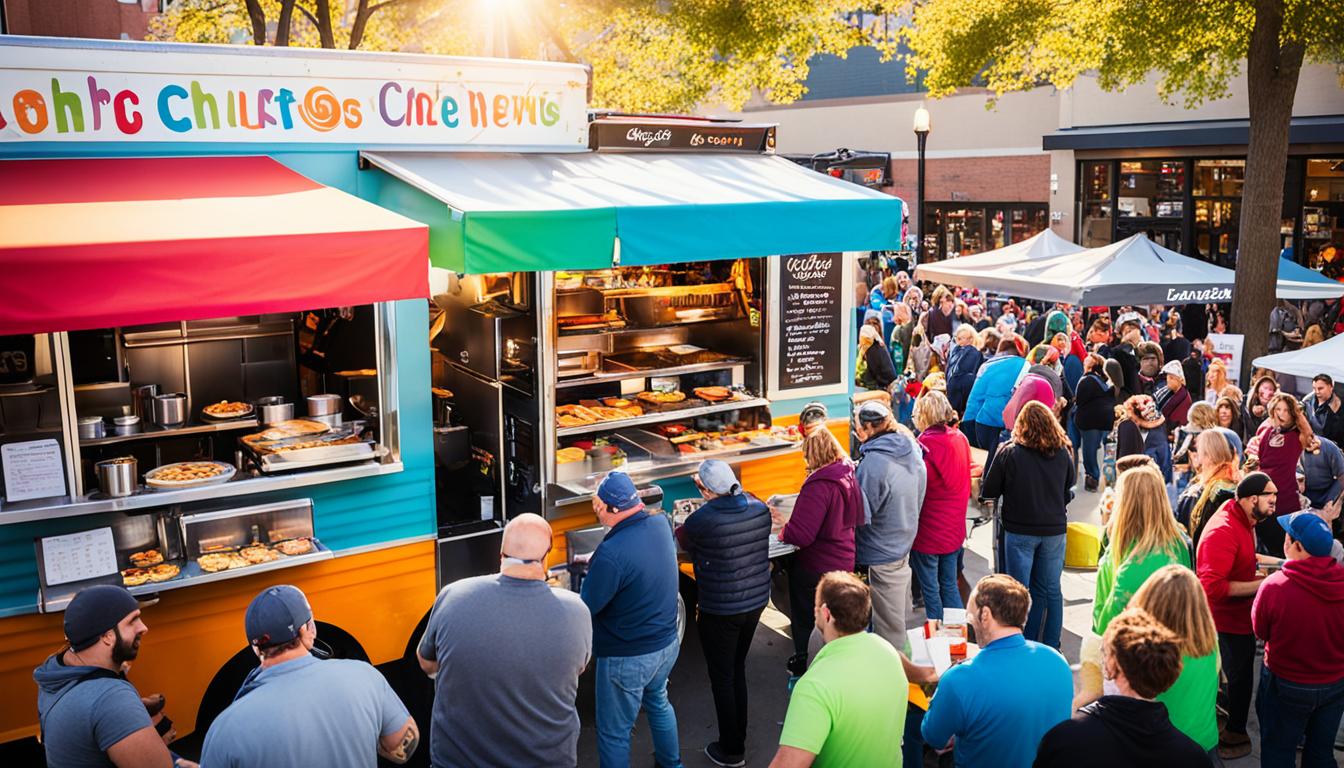Starting a food truck business in the UK can be a lucrative venture, but it requires careful planning and preparation. If you have a passion for food and want to take your culinary skills on the road, then owning a food truck could be the perfect opportunity for you.
But where do you start? How do you navigate the complex world of food truck regulations and ensure your business is a success? This essential guide will walk you through the steps to start a successful food truck business in the UK, providing you with all the information you need to get started.
From understanding the legal requirements and developing a menu to advertising your business and managing your finances, we’ve got you covered. By following the steps outlined in this how to start a food truck business guide, you’ll be well on your way to launching your very own food truck and making a name for yourself in the thriving UK food scene.
So let’s get started on your journey to becoming a food truck entrepreneur!
How to Start a Food Truck Business Legally?
When starting a food truck business in the UK, it is crucial to set up your business legally to ensure compliance with food truck regulations and avoid any legal complications in the future. Here are the key steps to follow:
- Register as a Sole Trader with HMRC: To establish your food truck business as a legal entity, you must register as a sole trader with Her Majesty’s Revenue and Customs (HMRC). This process involves providing your personal and business information and determining your tax obligations.
- Meet Safety Requirements: It is important to meet the safety requirements for food establishments in your local area. This includes obtaining the necessary licenses and permits, ensuring proper food handling practices, and maintaining a clean and hygienic cooking environment.
- Have a Driving License for the Food Truck: Since a food truck is a mobile business, you need to have a valid driving license to operate it legally on public roads. Check with the local authorities for any additional requirements specific to your area.
If you have no prior experience in the food truck industry, it’s essential to research and familiarize yourself with the specific regulations and requirements in the UK. This will help you navigate the legal landscape and ensure you start your food truck business on the right foot.
“Starting a food truck with no experience may seem daunting, but with the right amount of research and preparation, it is definitely achievable.” – James Smith, Owner of ‘Tasty Wheels’ Food Truck
Setting up your food truck business legally not only ensures compliance with regulations but also gives you a solid foundation to build your brand and establish trust with your customers. Taking the time to understand and meet the legal requirements will contribute to your long-term success.
| Advantages | Disadvantages | |
|---|---|---|
| Sole Trader |
|
|
| Partnership |
|
|
| Limited Company |
|
|

By setting up your food truck business legally, you not only ensure compliance with food truck regulations but also gain credibility and peace of mind. Take the necessary steps to establish your business, meet safety requirements, and obtain the required licenses and permits to operate legally in the UK.
Developing a Menu
Developing a menu is a crucial step in starting a food truck business. Whether you choose to offer customer favorites or experiment with new recipes, it’s important to ensure that your menu is appealing to your target customers.
Consider simplifying your menu items to streamline the cooking process and make it easier for customers to mix and match ingredients. By offering a concise selection of dishes, you can focus on perfecting the quality and execution of each item.
When developing your menu, it’s essential to pay attention to dietary safety and allergens. Ensure that your ingredients are stored appropriately and labeled accurately to avoid any potential health risks for your customers.
The UK’s Food Standard Agency provides valuable support on hygiene and storage practices, as well as online training courses to help you navigate these considerations. Take advantage of these resources to ensure that your food truck operates in compliance with the highest standards of food safety.
By focusing on menu development and prioritizing dietary safety, you can create a mouthwatering menu that resonates with your target customers and ensures a memorable dining experience.
Advertising Your Business
Advertising is a crucial part of running a successful food truck business. By utilizing social media platforms such as Facebook, Instagram, Pinterest, and TikTok, you can showcase your delicious dishes and circulate enticing advertisements to attract potential customers.
Engaging with local food bloggers and reviewers is another effective way to build brand awareness. Collaborating with these influencers can help generate buzz around your food truck and attract new customers.
Investing in well-branded packaging can also serve as a means of advertising. When your food is delivered in eye-catching packaging, it makes a lasting impression on your customers and helps create brand recognition.
To develop effective advertising strategies that resonate with your target audience, it’s essential to understand their preferences and conduct market research. By knowing what your customers want and tailoring your advertisements to their interests, you can maximize the impact of your marketing efforts.
Benefits of Social Media Advertising for Food Trucks
Social media advertising offers several advantages for food truck entrepreneurs:
- Wide reach: With billions of users, social media platforms enable you to reach a vast audience, increasing your chances of connecting with potential customers.
- Cost-effective: Compared to traditional advertising methods, advertising on social media is often more affordable and allows you to allocate your budget more effectively.
- Targeted advertising: Social media platforms offer advanced targeting options, allowing you to reach specific demographics based on their location, interests, and behaviors.
- Engagement opportunities: Social media provides a platform for direct engagement with your customers. You can respond to their comments and messages, building relationships and fostering loyalty.
By leveraging social media and combining it with other advertising strategies, you can increase your food truck’s visibility, attract new customers, and establish a strong brand presence in the market.
Next, let’s explore the financial aspects of managing your food truck business in Section 5.

Managing Your Finances
Effective financial management is crucial for the success of your food truck business. By carefully budgeting and finding ways to save money, you can ensure the growth and profitability of your venture. Here are some key steps to help you manage your finances:
1. Develop a Budget
Create a comprehensive budget that accounts for all your startup and ongoing expenses. Consider factors such as the cost of the food truck, equipment, licenses, insurance, food ingredients, wages, payment systems, and maintenance. Be thorough in your calculations to avoid any unforeseen costs.
2. Understand Average Food Truck Income in the UK
Research and understand the average food truck income in the UK to set realistic financial goals for your business. This information will help you determine how much revenue you need to generate to cover your expenses and make a profit. Stay updated with industry trends and adjust your pricing and offerings accordingly.
3. Find Ways to Save Money
Running a successful food truck involves finding cost-saving measures without compromising on the quality of your products. Consider bulk purchasing ingredients to lower costs, opt for energy-efficient equipment, and explore partnerships with local suppliers for discounted prices. Regularly review your expenses and identify areas where you can trim expenses without sacrificing value.
4. Optimize Your Operations
Efficiency is key when it comes to managing your finances in a food truck business. Streamline your processes and eliminate any unnecessary expenses or redundancies. Optimize your menu to minimize ingredient waste and maximize profitability. Explore technology solutions that can help you track sales, inventory, and expenses more efficiently.
5. Seek Professional Advice
If you are unfamiliar with financial management, consider seeking advice from a qualified accountant or financial advisor. They can help you develop a solid financial plan, navigate tax obligations, and provide ongoing guidance to ensure the financial health of your food truck business.
By effectively managing your finances, you can not only keep your food truck business afloat but also position it for long-term success. Explore different strategies, track your financial performance regularly, and adapt as needed to achieve your business goals.

| Expense Category | Average Monthly Cost (UK pounds) |
|---|---|
| Food Ingredients | £1,500-£3,000 |
| Staff Wages | £1,500-£2,500 |
| Equipment Purchase/Lease | £500-£2,000 |
| Licenses and Permits | £200-£500 |
| Insurance | £100-£300 |
| Marketing and Advertising | £100-£500 |
| Maintenance and Repairs | £200-£500 |
| Other Operating Expenses | £500-£1,000 |
Conclusion
Starting a food truck business in the UK can be an exciting and potentially profitable venture. By following this food truck start-up guide, you will be well-prepared to embark on your journey as a food truck entrepreneur. From setting up your business legally and developing a mouth-watering menu to effectively advertising your new venture and managing your finances, careful planning and execution are key to success.
Remember to stay updated with food truck regulations and continuously engage with your target customers. Analyzing market trends and adjusting your business strategies accordingly will help you stay ahead in the ever-changing mobile food industry. With determination, a solid mobile kitchen business plan, and a passion for food, you can launch a thriving mobile catering business in the UK.
Now it’s time to bring your culinary creations to the streets and delight customers with your delicious offerings. Whether you’re serving up gourmet burgers, international cuisines, or tasty desserts, the possibilities are endless. Don’t hold back – unleash your creativity, make your mark in the food truck industry, and carve out a niche for your mobile food business.




